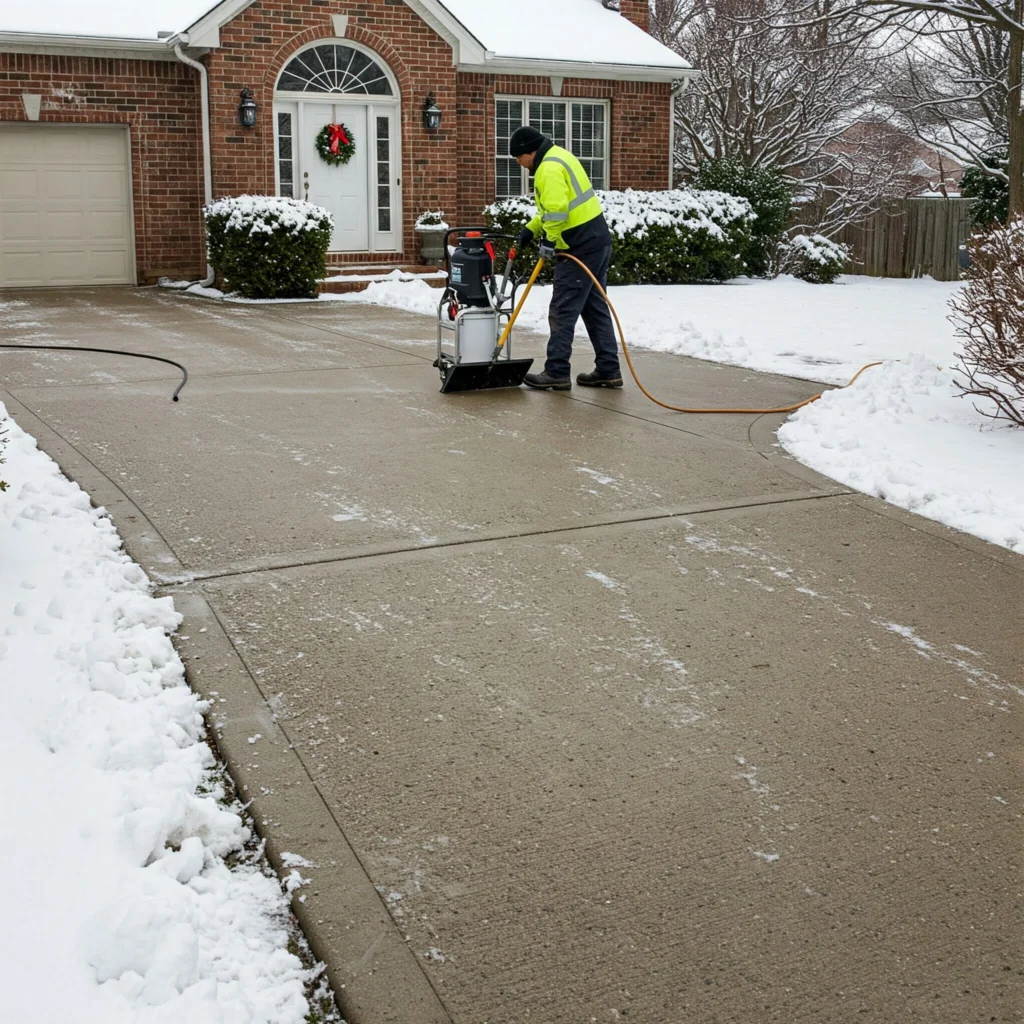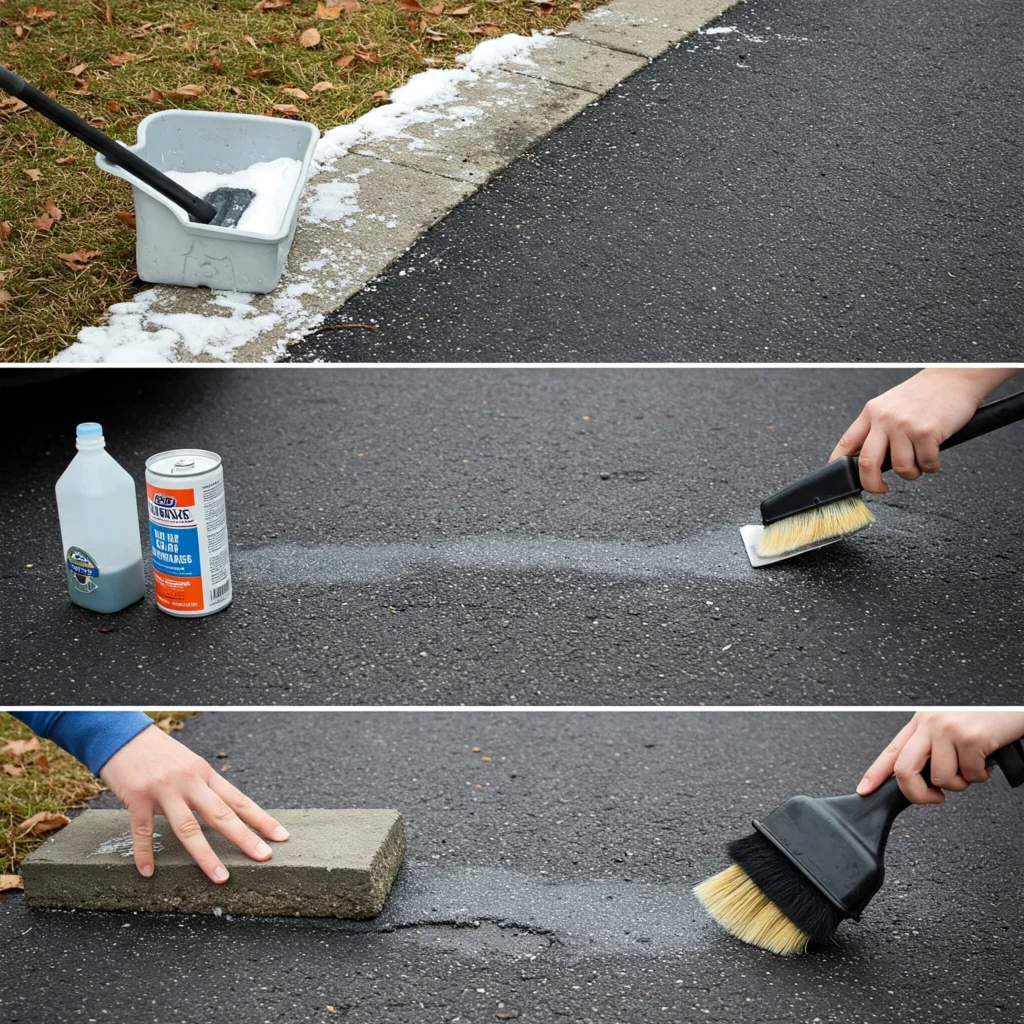Tired of road salt wreaking havoc on your concrete driveway every winter? You’re not alone! Many homeowners struggle to keep their driveways in top shape when harsh weather sets in. But don’t worry we’ve got your back.
In this guide, we’ll break down exactly how road salt damages concrete and, more importantly, how you can prevent it. You’ll learn simple yet effective strategies to protect your driveway, extend its lifespan, and maintain its curb appeal. From choosing the right de-icers to sealing your concrete, we’ll cover everything you need to know.
Don’t let winter weather ruin your investment! Keep reading to discover expert tips on safeguarding your driveway from road salt damage and keeping it looking great year after year.
You might like: The Ultimate Guide to Inspecting Your Home’s Chimney
Table of Contents
ToggleHow Road Salt Damages Your Concrete Driveway
Before we jump into prevention tips, let’s break down how road salt actually harms your concrete. Road salt (sodium chloride) is a go-to de-icer in winter, but while it melts ice and snow, it also takes a serious toll on your driveway.
Here’s how it happens: When road salt mixes with melting ice, it seeps into the concrete’s pores. As temperatures drop, this trapped moisture freezes and expands, creating internal pressure. Over time, this constant freeze-thaw cycle weakens the concrete, leading to cracks, surface flaking (spalling), and even potholes.
But that’s not all. Road salt also contains chloride ions, which can speed up the corrosion of any steel reinforcement inside the concrete. This weakens the structure even further, making repairs costly and unavoidable.
Understanding these effects is the first step in protecting your driveway from salt damage. Now, let’s explore the best ways to keep your concrete in top shape all winter long.
How to Spot Road Salt Damage on Your Concrete Driveway
Now that you know how road salt harms concrete, let’s go over the key warning signs. Catching these early can help you take action before the damage gets worse. Here’s what to look for:
- ✅ Surface Scaling – If you notice flaking, peeling, or small chipped patches on your driveway, road salt has likely weakened the top layer of concrete. This happens when moisture and salt seep in, causing the surface to break apart. As the damage progresses, it exposes the rough aggregate underneath, making your driveway more vulnerable to further wear and tear.
- ✅ Cracks – New cracks appearing after winter are a major red flag. When road salt absorbs into concrete and the trapped moisture freezes, it expands, putting pressure on the surface. This leads to cracks that start small but can quickly grow. If left unaddressed, these cracks will worsen over time, potentially causing structural issues and costly repairs.
✅ Pitting – Pitting appears as small, deep holes or indentations on your driveway’s surface. It happens when road salt interacts with the concrete, slowly eroding it and creating an uneven texture. Not only does this make your driveway look worn out, but it also weakens the surface, increasing the risk of more serious deterioration in the future.
If you spot any of these issues, it’s crucial to take action as soon as possible. The sooner you address road salt damage, the better chance you have of preserving your driveway and avoiding expensive repairs!
How to Protect Your Concrete Driveway from Road Salt Damage
Now that you know how road salt damages concrete and the warning signs to watch for, let’s dive into the best ways to protect your driveway. By taking these preventive steps, you can extend its lifespan and keep it looking great year after year.
1. Seal Your Concrete
Applying a high-quality concrete sealer is one of the best ways to shield your driveway from road salt damage. A sealer creates a protective barrier that prevents salt and moisture from penetrating the surface. Before sealing, clean your driveway thoroughly and let it dry. For the best results, reapply the sealer every couple of years to maintain its effectiveness.
2. Improve Drainage
Water pooling on your driveway increases the risk of salt damage. Make sure your driveway has a proper slope to direct water away from the surface. Keep your gutters and downspouts clear to prevent runoff from collecting near the edges. If needed, install drainage channels to keep excess water from seeping into the concrete.
3. Keep It Clean
Regularly removing road salt can prevent long-term damage. Use warm water and a mild detergent to wash away salt buildup, especially in high-exposure areas like entrances and edges. Avoid harsh chemicals and high-pressure washers, as they can weaken the concrete surface. A simple rinse every few weeks can go a long way in preventing deterioration.
4. Use the Right Snow Removal Tools
When shoveling snow, choose plastic or rubber-edged shovels instead of metal ones, which can scratch and chip the surface. If you need to break up ice, avoid metal scrapers or ice picks, as they can cause cracks and pitting. Instead, use gentler methods like applying sand for traction or breaking up ice with a safe de-icer.
5. Choose Safer De-Icing Alternatives
Instead of traditional road salt, consider using sand, kitty litter, or eco-friendly de-icers like calcium chloride or magnesium chloride. These alternatives provide traction and melt ice with less risk of damaging your concrete. While they don’t work as quickly as road salt, they help protect your driveway in the long run.
By following these preventive measures, you can reduce the risk of salt damage and keep your concrete driveway in top shape. Regular inspections and maintenance will further help you catch issues early and prevent costly repairs.
Winter Concrete Driveway Maintenance: Protecting Against Road Salt Damage
Winter can be brutal on concrete driveways, with road salt, ice, and snow causing significant wear and tear. To keep your driveway in top shape, follow these essential cleaning and maintenance tips throughout the season.
1. Keep Snow Off Your Driveway
Don’t let snow pile up! Regularly clearing snow helps prevent ice buildup and reduces the amount of road salt that seeps into the concrete. Use a plastic or rubber-bladed shovel instead of a metal one to avoid surface scratches. Removing snow in layers instead of all at once minimizes strain on the concrete.
2. Skip the Metal Tools
When dealing with ice, avoid metal scrapers or ice picks. These can crack or pit your driveway. Instead, opt for a plastic shovel or a rubber-edged snow pusher to break up and remove ice without damaging the surface.
3. Rinse Away Road Salt
Road salt can wreak havoc on concrete, causing cracks and deterioration over time. Regularly rinse your driveway with warm water and a mild detergent to remove salt residue. Pay extra attention to high-exposure areas. Avoid using harsh chemicals or high-pressure washers, as they can weaken the surface.
4. Inspect for Damage
Check your driveway often for signs of wear, including cracks, scaling, and pitting. Catching these issues early can prevent bigger problems later. If you spot damage, consider applying a concrete patch or consulting a professional for repairs.
Implementing these cleaning and maintenance tips can go a long way in protecting your concrete driveway from road salt damage. By taking proactive steps, you can ensure the longevity and durability of your investment.
Eco-Friendly Alternatives to Road Salt
Road salt isn’t your only option for melting ice. If you’re looking for safer and more environmentally friendly alternatives, here are some great options:
Calcium Chloride: Works better than traditional road salt at lower temperatures and is less harmful to concrete. Use it sparingly and follow manufacturer instructions.
Magnesium Chloride: Less corrosive than both road salt and calcium chloride, making it a great option for concrete protection. Use in moderation to prevent over-application.
Sand or Kitty Litter: These don’t melt ice, but they provide traction to prevent slips and falls. They’re also easy on your driveway and simple to clean up.
Why Professional Driveway Sealing is Worth It
If you want maximum protection, hiring a professional driveway sealing service is a smart investment. Here’s why:
Expert Application: Professionals know how to properly apply a high-quality sealer for the best protection.
High-Quality Materials: They use top-tier sealants that last longer and protect better than DIY options.
Saves Time and Effort: Sealing a driveway is labor-intensive. A professional job is faster and more effective.
Long-Term Cost Savings: A well-sealed driveway is less likely to suffer damage, reducing expensive repairs down the road.
When choosing a sealing service, research local providers, read reviews, and request quotes to ensure you get the best deal.
DIY Fixes for Road Salt Damage
If your driveway has already suffered some damage, don’t worry there are DIY solutions you can try before calling in the pros.
Crack Repairs: Use a concrete crack filler or patching compound. Clean out the crack, apply the filler, and smooth it out with a trowel.
Resurfacing: If your driveway has significant scaling or pitting, applying a thin concrete overlay can restore its appearance and functionality.
DIY Sealing: If you prefer to seal your driveway yourself, choose a high-quality concrete sealer, clean the driveway thoroughly, and apply it with a roller or brush.
Why Regular Maintenance Matters
Protecting your driveway from road salt damage isn’t a one-time task. Regular inspections and upkeep will help maintain its integrity for years to come. Here’s why it’s crucial:
Early Detection Saves Money: Spotting and addressing small issues early prevents expensive repairs later.
Maintains Curb Appeal: A well-kept driveway enhances your home’s appearance and value.
Extends Driveway Lifespan: Proper care ensures your concrete stays strong and durable over time.
By following these winter maintenance tips, you can protect your driveway from the harsh effects of road salt and keep it looking great year after year!
Conclusion
Taking care of your concrete driveway during winter doesn’t have to be complicated. By following these maintenance tips, using eco-friendly de-icing alternatives, and considering professional sealing, you can protect your driveway from costly damage and extend its lifespan.
Don’t wait until it’s too late! Start implementing these strategies today to keep your driveway safe and durable all winter long. If you need professional assistance, contact a trusted driveway sealing service in your area to ensure your concrete remains in top condition.
For expert concrete driveway repair and sealing, reach out to FoundationMD Houston Foundation Repair at 281-949-6233 for reliable and professional service!






